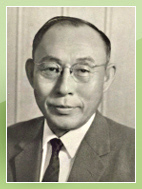About Konkuk
Founder
Dr. Yoo Seok Chang (Pen name Sang-huh)
1959.3.31~1961.9.30
is the founder of KU, and is nominated as one of the 13 private schools founders in the 100 years of the modern private schools history.

When Dr. Yoo Seok-chang (pen name: Sanghuh) opened the People’s Hospital on May 12, 1931, he had a single goal in mind: to provide decent medical care to less fortunate Koreans. Raised by a father who moved to Manchuria to join the Korean Independence Movement and trained as a medical doctor during the Japanese occupation of Korea, he did not hesitate to start the non-profit hospital to help those in need.
After founding the hospital, he realized that medical care alone, with the absence of education, could not give people a wholesome life. He brought his attention to the young Korean leaders in
Eventually, what Dr. Yoo and his friends wanted to achieve was revealed: a higher-level education that could cultivate minds dedicated to enlightening rural areas by living there and becoming an example, an educational policy that was not endorsed by Japan at the time. Dr. Yoo and his supporters managed a private organization for such purpose and honed their reformative ideas for a little more than a decade.
It was the liberation of Korea from Japan that enabled Dr. Yoo to transform Konkuk Eui-Sook (建國義塾, a private institution for training young Korean leaders) to Chosun School of Politics (朝鮮政治學館, a junior college for future politicians, accredited by the Ministry of Education in 1948), which was later renamed Konkuk University in 1959. As a strong believer in the role of higher education in maintaining Korea’s future sovereignty, Dr. Yoo and his supporters chose the name Konkuk (建國) ― meaning “founding a nation” in Hanja (Chinese characters) ― because they hoped that Konkuk graduates would serve Korea with a spirit of building the nation.
Years of experience in reforming rural areas and educating young leaders, along with a short stint as a politician, convinced Dr. Yoo that education goals should be set beyond academic excellence. Thus, during his tenure as President and Chairman of the Konkuk University Foundation, he emphasized three virtues that would make a respectable human being: sincerity, fidelity, and righteousness. His educational philosophy still guides Konkuk to this day.
Early on, Dr. Yoo was aware that the physical space given to Konkuk University may not be sufficient to provide future agricultural leaders with ample hands-on experience. Therefore, in the midst of the dire conditions of post-Korean War, he boldly executed a plan to move Konkuk to its current location (Seoul) despite severe financial difficulties and skepticism.
His vision proves to be right even four decades after he passed away: Konkuk University not only leads agricultural and life science research but also excels in many areas, thanks to his generous endowment and education philosophy. Moreover, in less than a decade, Konkuk went through a major transformation, incorporating a modern complex of a hospital, shopping mall, movie theatre, and residential facilities. Such advancements gave Konkuk the title of “the fastest growing university in Korea.” Today, the Seoul Campus, located in the heart of Seoul, comprises 21 undergraduate colleges and 15 graduate schools that offer a diverse range of programs. The Glocal Campus in the city of Chungju, Chungcheongbuk-do, consists of six undergraduate colleges and two graduate schools. As of 2014, a total of about 25,600 students study at the two campuses and abroad (i.e., through Konkuk’s study abroad programs), an enormous growth compared to the student population of 1950 which was only 146



